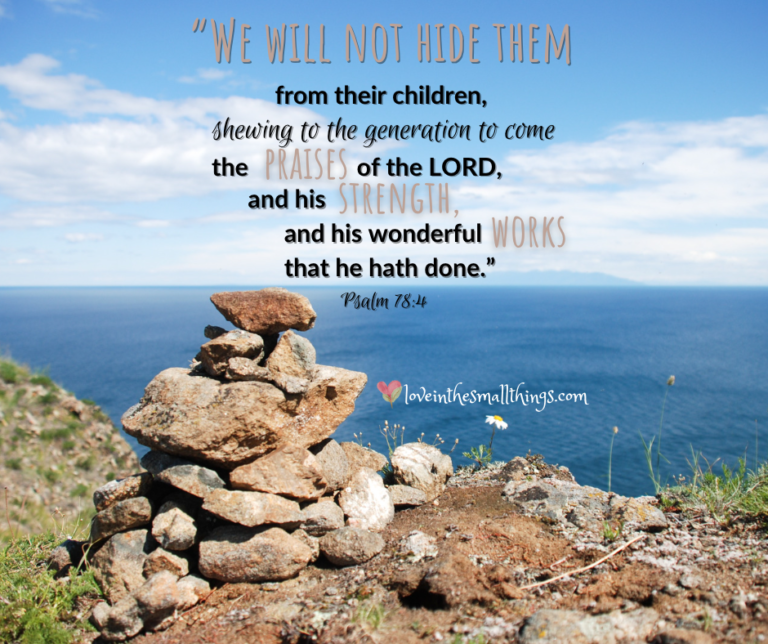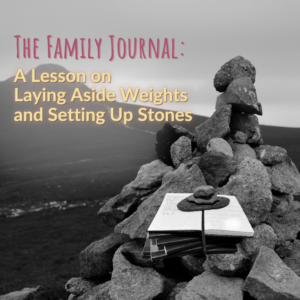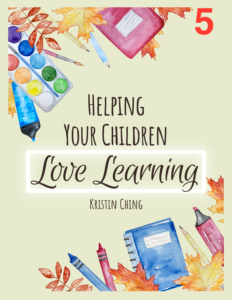The Family Journal: A Lesson on Laying Aside Weights and Setting Up Stones
A Wonderful Ideal
Several years ago I found notes I had taken long ago while listening to a workshop called “Letter Writing: A Legacy for All Generations” by Jill Novak. The class was so inspiring that I later bought her book and CD seminar set, The Gift of Family Writing. I determined to follow her suggestions to have an interactive journal for each child in which they and other family members could write to each other with words of encouragement, memories, blessings, ideas, Scriptures, etc. What a wonderful keepsake and treasure this would be for my children, I thought, to give them an ongoing record of God’s providence in their lives and our love for each other.
Reality
And yet, life happens. Like the three blank (and two only very partially filled) baby books on the shelf in our living room, the children’s journals soon fell out of use. The oldest child has many entries from Mom and Dad, and even a few adorable dictated or scribbled answers of his own, but the youngest children have nothing—not even their birth stories. Many memories are waiting for me to find the time to record them, and many more are lost forever to the faded past.
Renewed Vision
The idea of getting those journals back out and restarting them resurfaced several years ago when we unpacked from our move and found the children’s journals—many of them now moisture-damaged. I got Novak’s book back out and wrote two or three notes to the children in their journals, though I don’t think they ever replied. Then sometime later, a friend told me about the “blessing journals” she keeps with each of her children—they are simple, but her children love them so much that they brought them with them on vacation.
Laying Aside Weights
But I still haven’t made it a habit to pick those journals back up and start writing regularly. Why? Probably because that would mean admitting that I had missed years of journal entries, and if I do later add something about those missing years, it will be out of order. I wish I could go back through our calendars, text messages, and photos to try to piece together something of a family history to fill in the blank spaces first, but when will I find the time? So I wait, sitting on the side of the road, feeling that the enormous burden of my perfect ideal is too heavy for me to budge, much less pick up and carry.
What is this perfectionism? Just a carefully repackaged bundle of pride—thinking that I must do everything according to my plan or not at all, forgetting that it is the Lord I am to be serving, and He has put no such unmanageable weight on me. Far from it, God tells us to lay aside the weights hindering us.
“Wherefore seeing we also are compassed about with so great a cloud of witnesses, let us lay aside every weight, and the sin which doth so easily beset us, and let us run with patience the race that is set before us” – Heb. 12:1
Our weights might be sins, or they might be false beliefs about ourselves and selfish goals that have nothing to do with God’s plans for our lives. To be honest, sometimes I’m just disappointed that I can’t be supermom. I know I’m not matching up—can never match up—with the image of myself I want to create, living a perfectly organized life with perfectly educated children who are perfectly happy all the time.
When I see how I fall short, I have two choices: my natural reaction (regret) or the spiritual response (repentance). Regret leaves me staring at my faults and wallowing in self-pity at their consequences. Repentance humbly acknowledges any actual sin—anger, laziness, or ingratitude, for example—as a failure to obey God and live for His glory. Then it guides my gaze upward to the only one who can forgive my sins and wash me clean. Regret complains about all the hindrances that stand in the way of my goals and feels put out that I often fail to do what I want. Repentance accepts God-given limitations and weaknesses as opportunities for God to show His strength in me. Regret paralyzes progress because it is often motivated by pride; repentance gives grace for growth because it requires humility, and God “resisteth the proud but giveth grace to the humble.”
Setting Up Stones
But God does not only command us to set aside weights that hinder us. He commanded Israel to set up memorial stones that would be conversation starters and reminders to their children of God’s mighty works . . .
“That this may be a sign among you, that when your children ask their fathers in time to come, saying, What mean ye by these stones? Then ye shall answer them, That the waters of Jordan were cut off before the ark of the covenant of the LORD; when it passed over Jordan, the waters of Jordan were cut off: and these stones shall be for a memorial unto the children of Israel for ever. . . . And he spake unto the children of Israel, saying, When your children shall ask their fathers in time to come, saying, What mean these stones? Then ye shall let your children know, saying, Israel came over this Jordan on dry land. For the LORD your God dried up the waters of Jordan from before you, until ye were passed over, as the LORD your God did to the Red sea, which he dried up from before us, until we were gone over: That all the people of the earth might know the hand of the LORD, that it is mighty: that ye might fear the LORD your God for ever.” – Joshua 4:6,7,21-24
We would be wise to do the same today. We need to keep memories—but aren’t we doing that already? Don’t we have thousands of photos of almost every conceivable detail of our lives, more than any other generation in history?
Physical, Not Digital
Yes, but there are several vital differences between the memorials Israel set up and the photo rolls we can pull up on our phones at any moment. First, the stone memories were a permanent physical landmark that could be seen and touched at any time, not just a fleeting record that could be pulled up on a screen and then forgotten or deleted. God made us physical beings, not digital ones, and we—and our children—need long-lasting physical objects that stay before us and remind us of His goodness in a tangible, visible way.
Words, Not Just Pictures
Second, even though they were visible, these memorials helped the Israelites not because they were “pictures” of anything particular but because of the conversations—the words—they induced. The stones alone would help nothing without parents’ faithful explanation of their meaning. Just think about it—almost everyone on earth can see the beauty and wonder of God’s creation every day—if not plants and animals, then the heavens that “declare the glory of God.” Yet, most people don’t view these things as reminders of God’s glory because they have been told lies about them or, at least, never told the truth. We don’t need only pictures; we need words—the right words—to give our children a good understanding of God and His goodness.
Praises, Not Problems
Third, the monuments were there to remind them of the goodness of the Lord, not their own failures. Israel was never commanded to set up a memorial of their idol worship, their murmuring for water and meat, or even their forty years of wandering. Those things are recorded, but only as the background for God’s goodness in forgiving their sin, providing for their needs, and protecting them along the way. We shouldn’t with hypocritical motives try to hide the ugly, sinful parts of our family history. But neither do we have to dwell on them or go into great detail about them in order to show the mercies of God in helping us overcome them. We can ask God to give us the wisdom to know what to share, what would help our children to praise God for His deliverance and goodness without bringing an undue focus on the negative.
Organic, Not Chronological
Finally, Israel’s memorials—and the discussions they inspired—were organic, not perfectly linear. As I pick back up my children’s journals (or buy new ones to replace those that are moisture-damaged), I am tempted to wait until I can get everything in perfect order—their baby statistics and dates for all their “firsts,” favorite memorabilia and funny sayings, all the scraps of memories that are scattered here and there in files and boxes. But did you notice that Joshua does not have the Israelites carve a detailed linear history of the nation (starting with Abraham, or better, Adam) on the rocks? The history came elsewhere, but this memorial inspired a conversation that began right where they were—at the Jordan—and recounted the mighty acts of God in bringing them through that river. Then they were to continue by telling how that was similar to God’s getting them through the Red Sea—but it did not matter that these details were out of order. What mattered was that they remembered what God had done!
Move Some Stones Today
If you believe that God wants you to start recording His mighty works for your children, consider the following tips:
- Choose a blessing journal, a blessing jar, a blessing wall, or some other physical object that will be a conversation starter and a reminder of His goodness. I like using journals because they are long-lasting, portable, and provide more space for writing.
- Start where you are, with whatever you have. Assuming you’re going to journal, grab an empty spiral notebook off your shelf, or go to a discount store and buy a nice leatherette one if it will help you enjoy writing and remind you of the importance of this memorial without intimidating you with visions of perfection. After writing the first part of this post, I got college-ruled composition books and covered them in the decorative paper of each child’s choice. The most important rule is to start. Just open up the journal and begin writing about a recent blessing in your family’s history, or record something you praise God for in a particular child’s life.
- If you still have trouble with perfectionism, consider how happy you would be to have a journal of notes written for you by your parent, grandparent, or another loved one who has passed on. Would you care whether or not it was perfectly organized and beautifully and elegantly written? Or would you be delighted to have it, no matter how imperfect?
- To make this a regular habit, set a reminder on your phone to write in the journal(s) weekly, add a short journaling time to your regular weekly review if you have one, or think of another habit you already have ingrained that you could tag this habit onto. For example, once a week before bedtime, I have “Mommy time” dates with each of my children, and I plan to either use part of that time to record together a special memory from the week or write a note to them in the journal after I’ve sent them off to bed.
- Continue by recording other blessings in your family’s history that you most want your children to remember. Most important is your testimony of salvation, but you could also include stories of God’s protection, provision, and goodness in your family history, your birth and childhood, education, marriage, and your children’s births and childhoods. Include any particular answers to prayer and other blessings your children will never know about unless you tell them. Don’t worry about keeping things in order—remember, Joshua mentions the Jordan crossing before the Red Sea.
- If you later want to go back and arrange it differently or add in photos and memorabilia, you could always create a digital photo book with a service like Shutterfly or Blurb; this could even allow you to have a digital backup of your writing as well as multiple copies of content that you want to share with more than one child.
Whatever you do, don’t hide God’s works from your children!
“We will not hide them from their children, shewing to the generation to come the praises of the LORD, and his strength, and his wonderful works that he hath done.” – Psalm 78:4






2 thoughts on “Remember God’s Blessings: How to Finally Start Keeping a Family Journal”
Wow…this is a wonderful encouragement, mahalo! I’ve started writings/journaling in the past (years ago), then picked it up again. Felt the imperfection thing. I totally desire to continue with it and Lord willing, my hand will be able to handle the physical hand writing action. Hand numbs and or tingles just in texting.
Mahalo nui and may God continue to bless this sweet ministry, Kristin. Love you, girl…so much!
Such good thoughts, Kristin. I have a few things that my relatives have written to me, and you’re correct; it doesn’t matter that it’s not in a particular order–I’m just glad to have what I have. The thoughts on perfectionism/pride are convicting and encouraging at once. Thank you for putting your thoughts “on paper” for us once again.